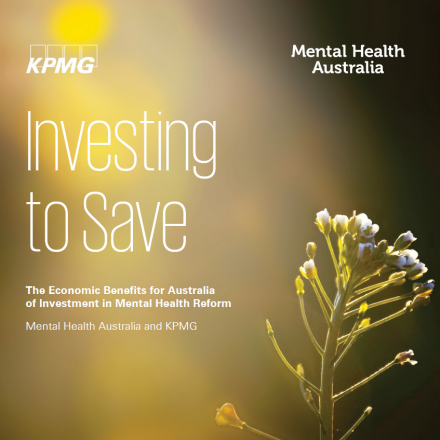CEO Update - PC makes recommendations to address NDIS woes
PC makes recommendations to address NDIS woes
I was very pleased to see the Productivity Commission release its position paper on NDIS Costs this week.
The Overview document and the full position paper (377 pages) are available here.
For a long time now we have been talking about the risk of the NDIS becoming an oasis in the middle of a desert, and it appears our analogy has been acknowledged and heard.
Over the next few weeks we will take the time to fully digest the paper, its recommendations and the implications for the mental health sector and for people living with mental health issues, however we are very pleased to see some of our key concerns being addressed in the Overview document.
For instance the Commission noted:
Most critically, it is important that people with disability do not see the NDIS as an oasis of support, surrounded by a desert, where little or nothing is available. Should such a dynamic develop, the financial pressures on the NDIS could be unsustainable, particularly if people feel the need to test their ability to qualify for the scheme, or remain in the scheme for as long as possible, for fear of not gaining access again should the need arise.
The Commission goes on to acknowledge our concerns regarding overall numbers:
Mental health services are an area of particular concern. The National Mental Health Commission’s report on Mental Health Programs and Services estimated that about 700 000 Australians experience a severe mental illness in any one year. However, according to the NDIA, only around 64 000 people with psychosocial disability are expected to be eligible for individual packages in the NDIS.
Importantly, the Commission recognizes that the problems do not all reside with the NDIS. Many of the issues that need to be addressed relate to the responsibility of governments to continue to provide services outside the NDIS.
Clearly, there needs to be support for people with mental health illnesses outside of the scheme — a responsibility that remains (largely) with State and Territory Governments. However, governments have been withdrawing their funding for a number of mental health support programs in their jurisdictions and using this funding to offset part of their contribution to the NDIS. At this stage, it is unclear what supports will be available for people with a mental illness who do not meet the NDIS eligibility criteria and this should be clarified as a matter of urgency.
The Commission notes the tremendous uncertainty that arises because these issues have not been addressed, and the impact that this uncertainty can have on those living with mental health issues, and trying to make decisions about how best to manage them.
The implications of this are significant. Not only is this uncertainty distressing for those with mental illness, any gap in support would place an additional call on the generosity of informal support. Gaps could place another pressure on the financial sustainability of the NDIS should it encourage scope creep, or force those who are unlikely to meet the eligibility criteria to test their access for fear of having few supports should they not qualify for the scheme. Mental health and psychosocial disability have been made a key priority of the DRC, but more clarity is required.
All of this points to the urgent need for governments to sit down and agree on who is responsible for what, and to articulate how services will be made available for those who will remain outside the scheme.
While the Australian and State and Territory Governments have agreed to provide continuity of support for disability services outside the NDIS, in practice there is confusion and uncertainty about what services will continue to be provided and/or funded. Governments need to be clearer about how they will approach continuity of care, and in particular about what disability services they will continue to provide for people who are not eligible for the NDIS.
The Commission has made some very important practical suggestions:
• Governments should immediately disclose their estimates of in scope and out of scope populations in a manner that is transparent and accountable – both pre scheme and post scheme estimates.
• The NDIA should employ specialist planners, with mental health qualifications, in order to develop plans for people living with psychosocial disability.
• Consideration should be given to the establishment of a specific psychosocial disability gateway within the NDIS.
• The NDIA should move towards an Independent Pricing Authority, in order to ensure pricing adequately covers the service responses required, and promotes the long term sustainability of both service providers and the NDIS.
It is a draft report, and the Productivity Commission has invited submissions. Let’s hope the ongoing drafting process does not slow down the urgent implementation of some of the remedies suggested.
Submissions in response to the Position Paper are due by 12 July 2017.




